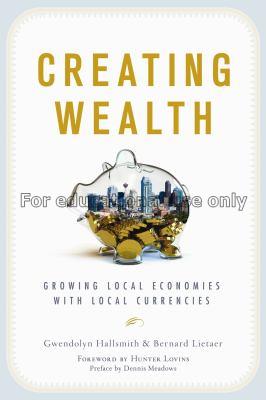Creating wealth : growing local economies with local currencies / Gwendolyn Hallsmith & Bernard Lietaer ; preface by Dennis Meadows ; foreword by Hunter Lovins
Author : Hallsmith, Gwendolyn

Communities everywhere are challenged by issues such as health, elder and child care, housing, education, food security, and the environment. On the surface, these problems appear to be rooted in economic crisis—for example, budget cuts have triggered reduced public services, soaring food prices have created food security concerns, and the subprime mortgage disaster has spawned record increases in foreclosures and homelessness.However, if communities could match their unmet needs with their underutilized resources, many would find that while their economies may be struggling when measured in traditional terms, they possess enough genuine wealth to allow all their inhabitants to enjoy a vastly improved quality of life. Creating Wealth demonstrates how a healthy society can be attained through developing new systems of exchange. Using creative initiatives such as time banks, systems of barter and exchange, and local currencies, cities and towns can empower themselves and build vibrant, healthy, sustainable local economies.In addition to presenting many compelling case studies of successful alternative currencies in action, Creating Wealth also explores the different types of capital that communities have to draw on, including natural, built, social, human, institutional, cultural, technological, and financial. This book will appeal to community activists, city planners and other public officials, and anyone interested in developing strong local economies.Gwendolyn Hallsmith is the founder and director of Global Community Initiatives and the author of The Key to Sustainable Cities.Bernard Lietaer is the world's leading authority on complementary currencies and the author of The Future of Money.The power of local currenciesLocal currencies have been introduced in thousands of communities around the world in response to the economic crisis because they offer an alternative to money as a way of meeting important human needs. Community leaders can mobilise assets using complementary currencies to address social and economic issues including health care, education, elder care, environmental problems, housing, and food security
Related Book